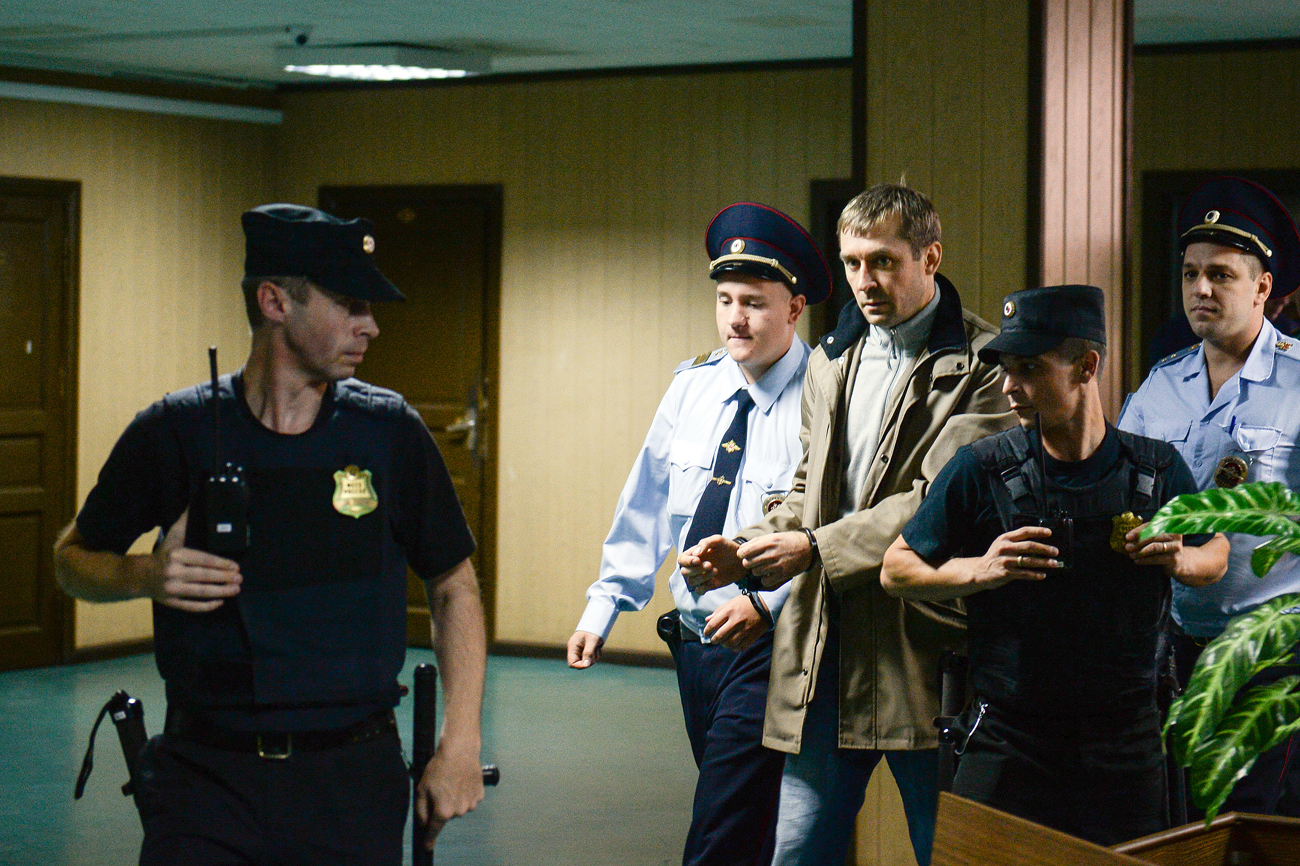
Acting head of the T Department of the Central Anti-Corruption Board (Guebipk) of the Russian Interior Ministry Dmitry Zakharchenko suspected of bribery at the Moscow Presnenksky Court.
Eugene Odinokov/RIA NovostiEarly on Sept. 9, 2016, investigators from the Federal Security Service (FSB) and the Investigative Committee paid a visit to the Russian Interior Ministry’s Main Directorate for Economic Security and Countering Corruption. The investigators conducted a search in the office of Col. Dmitry Zakharchenko and then arrested the man: 15 million rubles ($234,000) in cash was found in his car and the colonel was unable to explain the origin of the money.
The money turned out to be just a fraction of the haul seized by the special services later in the day. After searches of apartments belonging to Zakharchenko and his close relatives, the investigators found an enormous sum of money: 2 million euros and $120 million in cash. The total amount seized was nearly 9 billion rubles ($140 million).
According to the REN TV channel (in Russian), the money weighed about 1.5 tons: Police had to use shopping carts to remove it from the flats. Yevgeny Royzman, the mayor of Yekaterinburg (900 miles east of Moscow), later tweeted (in Russian) that the seized amount equals a quarter of the annual budget of the Urals city (which has a population of 1.5 million people).
Zakharchenko, who ironically was in charge of Division T in the Russian Interior Ministry’s Main Directorate for Economic Security and Countering Corruption, maintained that he had no idea where the money was from, but that did not stop the investigators from charging him under three articles of the Criminal Code, including receipt of a large bribe. On Sept. 10, a court remanded him in custody for two months.
According to the investigation, Zakharchenko’s official pay for the past several years did not exceed 3 million rubles (about $47,000).
According to the RIA Novosti news agency, which has sources (in Russian) in the law-enforcement agencies, the seized money did not in fact belong to Zakharchenko: The colonel was allegedly storing the money at the request of the managers of Nota Bank, whose license was revoked in November 2015 after some 26 billion rubles ($400 million) went missing from its accounts. The senior management of the bank and financial manager Galina Marchukova were detained but the money was never found.
The RIA source believes that Zakharchenko, who is from the same region as Marchukova and a good acquaintance of hers, warned the woman of her impending arrest and took part of the stolen money for temporary storage.
An Interfax source (in Russian) linked to the investigation told the news agency that Zakharchenko had assisted a suspect in another high-profile case to flee from investigation. The fugitive is Mikhail Slobodin, the former managing director of Vympelcom (which owns one of Russia’s top mobile operators, Beeline).
On Sept. 5, 2016, the Investigations Committee put Slobodin on the wanted list on suspicion of receiving bribes totaling 800 million rubles ($12.5 million). However, it turned out that the businessman had managed to flee abroad several hours earlier. According to the Interfax source, it was Zakharchenko, familiar with the case, who warned Slobodin of his impending arrest.
For their part, Gazeta.ru sources (in Russian) link Zakharchenko’s arrest to the continued infighting within Russian law-enforcement agencies. According to Gazeta.ru (in Russian), the colonel lost his “protection” after the recent senior reshuffle at the FSB’s economic security department: The influential patrons he used to have there were removed, which allowed the FSB and the Investigative Committee to move in on the colonel.
With a haul of 9 billion rubles ($140 million), the corruption scandal around Zakharchenko is the biggest in recent years. Kremlin press secretary Dmitry Peskov said (in Russian) that the president was closely following the Zakharchenko case and was “in full possession of all the information.” He emphasized that the fight against corruption will continue.
Amid public indignation at rampant corruption, first deputy chairman of the Federation Council defense and security committee Frants Klintsevich went as far as suggesting (in Russian) that Russia should consider introducing the death penalty for corruption crimes (at the moment, there is a moratorium on the death penalty).
Those who do not adhere to such radical views are nevertheless worried by the huge problem presented by corruption – like State Duma deputy Alexander Khinstein, who posed (in Russian) a rhetorical question: “If a colonel has that kind of money, can you imagine what some of our generals may be hiding?”
All rights reserved by Rossiyskaya Gazeta.
Subscribe
to our newsletter!
Get the week's best stories straight to your inbox